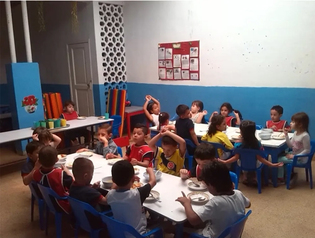
In Colombian preschools where money went toward additional teacher training, children’s scores in areas like school readiness rose.
View full image
When the Colombian government poured funds into putting teaching assistants into the nation’s preschool classrooms more than a decade ago, it had no effect on children’s development, finds a new study by Orazio Attanasio, the Cowles Professor of Economics, and his colleagues in the Journal of Political Economy. But there was one notable exception: when the money was accompanied by a training program for existing teachers, children’s scores in areas like school readiness and receptive language showed significant improvements compared to money alone.
Here’s why that might have happened, Attanasio suggests. Preschool teachers were already working unpaid overtime before the government program came into effect, dealing with administrative as well as teaching and caring duties. After the new teaching assistants arrived, the teachers spent less time in the classroom, the researchers found. They worked less overtime. However, the TAs were less skilled and less experienced. Learning activities in the classroom took a backseat. Kids’ abilities stagnated.
Teachers in a subset of preschools, however, were selected to undergo additional training as well as receive a teaching assistant. The Colombian National University provided 13 months of mostly remote classes that delved into the importance of learning activities for young children and suggested new ways of incorporating them into class. Instead of leaving their assistants alone in the classroom, these teachers tended to delegate tasks like changing diapers and putting children down for naps to them, then focused more on teaching themselves.
“My hunch is that there is a combination of factors,” says Attanasio. With training, “the teachers become more aware that different activities might have different impacts on the children. They learn to manage their time and the TAs’ time more effectively. It’s also possible that they become more effective in doing these activities.”
In schools where teachers had training, children’s scores in several areas rose over the course of the study. The improvement was moderate, but the researchers estimated that the boost to cognitive development amounted to around 20 percent of the difference between a disadvantaged six-year-old and an upper-middle-class six-year-old in Colombia.
The training program was very inexpensive, a tiny fraction of the sum spent on hiring the new assistants. While it did place demands on teachers’ time, “it’s almost a miracle that with this little training they become more effective,” Attanasio reflects. In education, it seems, a little goes a long way.
 loading
loading